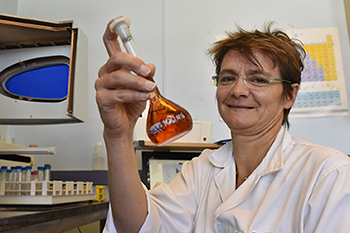Latest News Archive
Please select Category, Year, and then Month to display items
15 March 2022
|
Story Rulanzen Martin
|
Photo Supplied
 The keynote speakers are Dr Khabele Motlosa (right), Senior Lecturer in the Department of Political and Administrative Studies at NUL, and leading Pan-Africanist scholar Prof Molefi Kete Asante(left).
The keynote speakers are Dr Khabele Motlosa (right), Senior Lecturer in the Department of Political and Administrative Studies at NUL, and leading Pan-Africanist scholar Prof Molefi Kete Asante(left).
The
Centre for Gender and Africa Studies (CGAS) at the University of the Free State (UFS), together with the
National University of Lesotho (NUL) and the Academic Forum for Development of Lesotho, is hosting an online think tank on the transnational communities of the Lesotho-South Africa border from 19 to 21 March 2021. The theme of the conference is
Lesotho and South Africa: a clarion call for a Pan-Africanist future.
Dr Munyaradzi Mushonga, Programme Director: Africa Studies Programme in CGAS, is the convenor of the conference and is also leading the UFS borderlands panel. The borderlands project is jointly funded by the Office of the Dean: Faculty of the Humanities at the UFS, and the National Institute for the Humanities and Social Sciences (NIHSS).
For more information and to register for the conference, click here

UFS Ground Studies Laboratory receives accreditation to international standard
2016-03-18

Lore-Mari Deysel, Deputy-Director of the institute for Groundwater Studies.
Photo: Charl Devenish |
The Institute for Groundwater Studies (IGS) Laboratory at the University of the Free State is on equal footing with international testing labs. With its accreditation in March 2016 by SANAS (South African National Accreditation System), the IGS Laboratory now officially meets global standards.
Quality of water
The IGS Laboratory mainly analyses the quality of water samples. When it was originally established in 1989, the lab’s central function was to conduct testing for researchers at the institute itself. “After the public and water boards realised their need to analyse water samples, the IGS Laboratory expanded to deliver a service to these clients,” says Lore-Mari Deysel, Deputy-Director of the institute.
Since suppliers and regulatory authorities will not accept test or calibration results from a lab that is not accredited, the IGS initiated the accreditation process.
Accreditation to international standard
In order to be deemed technically competent and able to receive accreditation, labs must meet the ISO/IEC 17025 standard. ISO/IEC 17025 was first issued in 1999 by the ISO (International Organization for Standardization) and the IEC (International Electrotechnical Commission).According to Deysel, this is the single most important standard for calibration and testing laboratories around the world.
“Laboratories that are accredited to this international standard have demonstrated that they are technically competent and able to produce precise and accurate test and/or calibration data. Furthermore, it demonstrates that the university has the capacity to supply valuable and reliable services alongside the academy,” Deysel says.